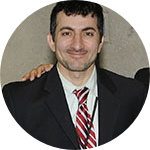About This Project
In this study we are proposing to study how high levels of day-to-day stress and our body’s response to stress are related to memory and the risk of Alzheimer’s disease. We plan to interview individuals with and without memory difficulties and measure their level of stress as well as their reaction to stressful events. If we identify that stress is related to memory or to the risk of Alzheimer’s disease, this could lead to research to improve memory or decrease the risk of Alzheimer’s disease.
Ask the Scientists
Join The DiscussionWhat is the context of this research?
A high level of stress leads to poor health and accelerated aging. In particular, stress is associated with heart disease, hypertension, and possibly memory loss. We believe that this difference in response may explain why some individuals develop stress-related diseases whereas other don’t. In this study we will evaluate both the amount of stress one is exposed to and the body’s response to stress as they relate to both memory and the risk of Alzheimer’s disease. A major barrier to answering this question is that we have limited ability to assess the body’s response to stress without using “invasive” equipment. We are proposing to raise funds to support building a stress-response measuring system. This will be used to test a group of individuals with or without memory problems.
What is the significance of this project?
In this combined effort between engineers and clinician scientists, we are working on developing a prototype of a system that will measure various biological signals during stress. In this effort we are combining the expertise in measuring blood pressure, heart rate, respiratory rate, and amount of sweating. The significance of this study is that it will allow us to more accurately and more comprehensively measure the body's stress response without needing to subject the person to needle and catheter insertion. This will further expand this field by providing an example of a system that will allow other investigators to pursue non-invasive, ie without needing catheter insertions, assessment of stress.
What are the goals of the project?
The goals of this project is to develop the stress response measuring system. This system includes a finger blood pressure cuff (similar to the one used in doctor’s offices but it is smaller and is wrapped around the finger), a heart rate monitor (including gel-like pads applied on the chest), a respiratory monitor using a chest belt, and an indicator for how much sweating occurs during stress using 2 small finger electrodes. Once we build the system we will test in a group of individuals with or without memory loss.
Budget
The blood pressure monitor we will be purchasing is the Caretaker. The data acquisition module we'll be purchasing is the Biopac MP150. The last item we will need is a laptop with bluetooth technology to collect multiple physiological signals.
The funds we are raising will be used to partially support the purchase the required parts (described above) and to develop the prototype system. The funds will also be used to support a graduate student effort to both setup the system and to test the system in the participants in this study.
Endorsed by
Meet the Team
Team Bio
Dr. Hajjar's research team is studying the effects of dynamic blood pressure and other cardiovascular markers in predicting cognitive function and decline. He previously served as the Associate Director for the Cardiovascular Research Porgram at the Institute for Aging Research at Harvard Medical School and was the head of the Geriatric Section at the University of Southern California.
Ihab Hajjar, MD
Dr. Hajjar is a clinician investigator at Emory university ( since 2014) with a focus on the link between hypertension and vascular disease with brain health including cognitive and cerebrovascular function. Dr. Hajjar has published more than 50 scientific articles and book chapters and has been funded by grants from National Institute of Health and other governmental and private organizations since 2001.
Project Backers
- 4Backers
- 4%Funded
- $194Total Donations
- $48.50Average Donation

